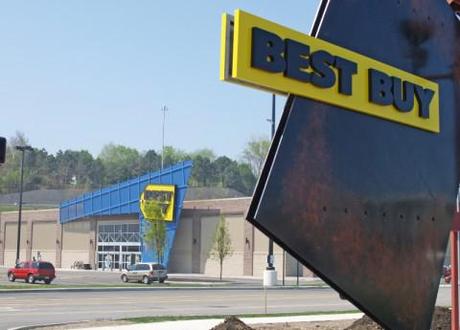
A Best Buy - the last of its breed? Photo credit: http://www.flickr.com/photos/crawfishpie/492887177/
US consumer electronics retailer Best Buy is not having a good week: After announcing on Thursday that it would be shuttering 50 of its “big box” bricks-and-mortar stores and cutting 400 jobs in an effort to become profitable, Best Buy’s stock promptly plummeted and commentators seemed more than eager to write the company into the grave.
In fact, it’s just the latest in a string of poor weeks for the mega tech retailer. The company posted a $1.23 billion – that’s billion, with a “b” – last year, shaving $3.36 off each share. Best Buy is largely losing out to online retailers like Amazon, and to physical discount stores like Wal-Mart and Target. Best Buy is now looking to reduce costs by $800 million by 2015, and revise its business model by not only shuttering stores, but also opening 100 new Best Buy Mobile stores, smaller locations in malls and the like focusing on phones; compensating staffers on the quality of their customer service; and boosting online sales by 15 percent.
Investors, however, weren’t convinced by Best Buy’s big plan: Best Buy shares plummeted 7 percent to $24.77 in New York on Thursday, according to the Financial Times. Analysts are cautious, though some see this as a step in the right direction – but only time will tell.
So, is the era of “big box retail” really over? Can Best Buy turn it around?
‘Big box’ is over; ‘small box’ is in. Best Buy’s announcement is just one indicator of a new retail reality, wrote David Welch, Chris Burritt and Lauren Coleman-Lochne at Bloomberg: “The era of big-box retail dominance is coming to an end.” By “big box”, they mean those cavernous warehouses of consumerism erected along American highways and in shopping plazas by the likes of Target and Wal-Mart, as well as Best Buy. Though those retailers are still in business (and eating up Best Buy’s market share), big box stores have not weathered the recession well and now, companies are trending towards smaller stores; as the writers suggest, “The new mantra is small box.”
Good luck with that, Best Buy. Best Buy’s plan hasn’t just gone over poorly with investors – commentators are also not impressed. Wrote Lauren Heller are Forbes, “[S]ince when is cost cutting to profitability a successful retail strategy? Since never.” Heller continued, “Sometimes the bigger thing to do is go small, but a retailer still has to sell more stuff, not just jettison the people and locations that are supposed to help it do just that.” Larry Downes, Heller’s colleague at Forbes covering tech, who has long prophesied the end of Best Buy, agreed, noting that the company’s “gradual disappearance took a predictable next step” with the announcement. Best Buy’s biggest problem is that the consumer experience is dreadful (the stores are “torture chambers”, says Downes) and that they’ve squandered opportunities to remain a go-to place for tech buyers on items, such as high-end televisions, that can’t be easily purchased online.
Can it be saved? Only if customer experience improves. A number of commentators seem to think yes, but perhaps not with the plan Best Buy has laid out. The biggest sticking point for most observers seemed to be the crap consumer experience Best Buy offers. Downes, at Forbes, suggested Best Buy execs take a walk over to an Apple store to look at a successful retail experience, and take notes. Harry McCracken, writing at TIME’s Techland blog, said that he thought the problem was solveable, but noted, “[M]y experiences at its stores lately have been getting worse, not better.” He suggested matching Amazon’s prices, for a start; binning the long lines of bric-a-brac at the check-out; making it possible for customers to actually try the products – which they can’t do if those sample products are busted or turned off; and making sure that sales staff aren’t at work just to offer the hard up-sell or hang out with each other. But if it doesn’t make changes, and fast, “Best Buy is on the same track that two former train wrecks were on, CompUSA and Circuit City,” Brooke Crothers noted at CNET.

